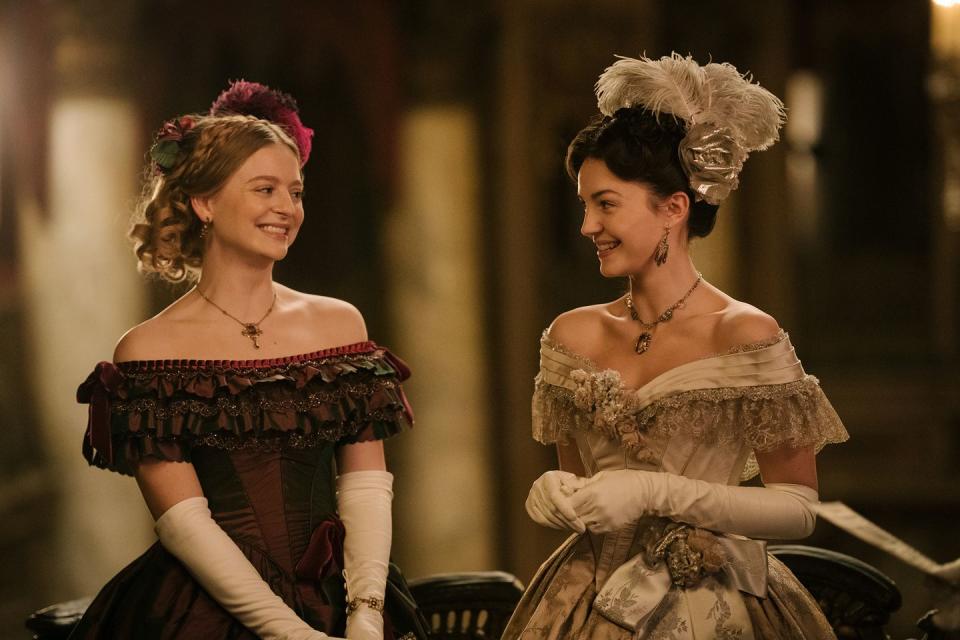How Dickinson Changes The Way We Should Read Its Namesake Poet

“She’s been doing this more and more these days, hiding like some madwoman in an attic,” Jane Krakowski’s Mrs. Dickinson says of her daughter in the penultimate episode of the second season of Dickinson on Apple TV+. “I do hope it’s just a phase.”
The joke is classic Dickinson in that it relies upon our knowledge of Emily Dickinson, the person, but only works because of Emily, the character in Dickinson. Emily is not the shy, timid recluse of her mythology, but a bold, brave, and ambitious writer. It’s funny because we can’t imagine Hailee Steinfeld’s Emily ever choosing total obscurity.
It is part of the conceit of the show, which dwells in contrasts, mainly of the past and present—a soundtrack of contemporary pop and hip-hop; dialogue that mingles millennial affect with 19th-century vernacular. (“It’s kind of trashy,” Anna Baryshnikov’s Lavinia Dickinson says of The Scarlet Letter; then, in the same scene: “it’s ribald.”) But the decision to play Emily in this way is more than just an exercise in contradiction: With an Emily that is playful and daring, Dickinson supports reading Emily Dickinson’s work similarly—not as nervous and hesitant, but rather as striking and urgent.
I chose a lesser-known poem by Emily Dickinson as the epigraph for my début novel, All Girls, a book about teenage girlhood, and one I wrote because I feel young women deserve to be seen more fully: as capable humans with rich and complicated interior lives.
“I stepped from Plank to Plank” depicts a speaker making her way across a hazard in a “slow and cautious way,” developing as she goes “that precarious Gait” called “Experience.” It is possible to read the poem and conjure an image of a person carefully tip-toeing over a pitfall—in other words, someone who is frightened, someone whose steps are faltering, uncertain. This would fit with the legend of Emily Dickinson, the hermit, practically paralyzed by her introversion. But it is equally possible to simply flip the lens, apply a different filter—particularly if we see the poem through to the end (the gaining of “Experience” like a prize): The speaker making her way across a danger is choosing to do so, bravely, in spite of the vast hungry nothing that might swallow her up if she stumbles. It is, to me, the perfect metaphor for girlhood—and an interpretation of Dickinson (both the person and the work) that is encouraged by the show. On Dickinson, Emily is earnest and absurd, melodramatic and profound. She is a whole messy person.

In Emily Dickinson’s lifetime, there were few acceptable ways for women to express themselves—art may have been a permissible endeavor, but only as a hobby, not a career pursuit. In Dickinson, Emily struggles with these constraints, and whether she even wants to be known for her craft. If writing was and is Emily’s voice, and the poem “I stepped from Plank to Plank” is an examination of how she develops the confidence in her capacity to speak, it is ultra-fitting for a book about girls finding their voices—but I don’t think it’s necessary to get that into the weeds. I’m a former high school English teacher; I know what a hurdle poetry can be—especially non-contemporary poems. And this is where I think some of the genius of the show lies: in its fluidity of approach.
Dickinson is dreamy, surreal, inventive, funny—but also whip-smart, sharp, serious art. Every episode is a layered text. But you do not have to have read a single one of Emily’s poems—to know anything at all about her use of flies and bees and birds and Death—to enjoy the series. The same is true of poetry, and of Emily’s in particular: you do not need to unpuzzle her work; her poems are not riddles that have correct answers. If Dickinson can convince us of nothing else, I hope it’s that: Poetry is for feeling, not for solving. We are meant, simply, to pay attention, to listen, to give it a chance to be.
You Might Also Like

